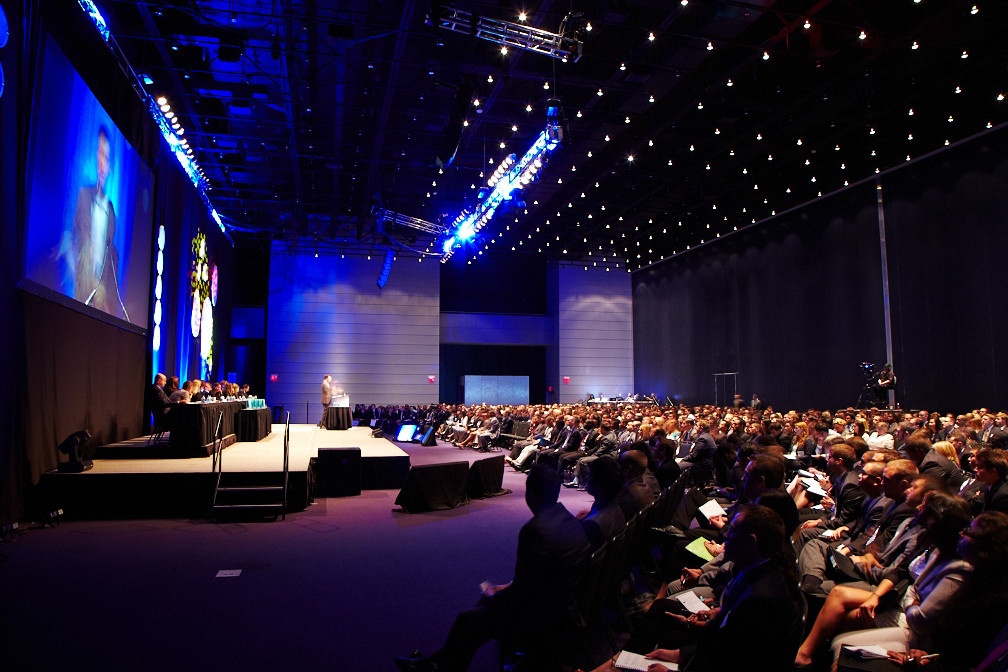11 Ways to Get More Out of Your Next Conference
Get the most out of your next conference with 11 tips on maximizing your attendance experience.

People attend business conferences for a variety of reasons. Some go to learn more about their particular specialty, some go for the networking opportunities, and others go simply because their company bought them tickets and they have to. Conferences can often be stressful events with an overwhelming amount of information, awkward social events, and bad boxed lunches. But they can also be great learning and networking events where you get a lot of great information and make connections with industry leaders and peers. Plus, sometimes the food is actually good.
But there are ways to make them less stressful and make the most out of your experience. Here are some tips to maximize your conference attendance strategy:
The success of most things depends on the preparation you do ahead of time. Similarly, when it comes to conferences, there are certain things you can pack and do ahead of time that will make your experience much more survivable.
Before the Conference
1. Pack Wisely
Comfortable Shoes
While your colleagues back at the office might look at conferences as glamorous events, most conference-goers know it’s long days filled with lots of walking and then even more walking when you inevitably get lost in mammoth convention centers (on the bright side, you’ll have no trouble getting to the recommended 10,000 steps a day). Naturally, part of getting the most out of a conference is being comfortable and not letting aching, blistered feet keep you from a good session or networking brunch.
Business Cards
You never know how many people you’re going to meet, so having extra business cards on hand for those networking opportunities is always a good idea.
Phone and laptop chargers
A huge part of your day will be spent taking notes at sessions and navigating around the convention center, so make sure you’re charged in the morning and have a backup charger on hand for the day.
Tote or Giveaway Bag
Most conferences have exhibitors and sponsors with a ton of “tradeshow swag” at their booths. If you’re looking to bring back some gifts for the office or simply want to collect extra chargers or office ornaments, pack a tote or simply try to find a booth giving one out before you claim the rest of your freebies.
2. Set Your Agenda Ahead of Time
One of the biggest mistakes I made at my first conference was not looking at the agenda beforehand. I thought I could simply pick sessions over breakfast and then plan it day by day. As a result, I was overwhelmed with dozens of sessions I wanted to attend, but couldn’t because they were in the same time slot and I hadn’t factored in the walking time it would take to get me from one session at one end of the convention center to the next. Now, I study the agenda beforehand, pick out the speakers and sessions I think would be most beneficial, and then eliminate or move some around depending on the feasibility of walking to different sessions.
3. Have an Elevator Speech
Inevitably someone is going to ask you what you do. Whether it’s an exhibitor or another attendee, having a prepared summary of what you do will help in the event you want to network with others or simply don’t want to come off with a rusty, rambling answer.
At the Conference
4. Keep Track of Connections
Any time you get a business card, keep a pen on hand to write down a few conversation points or reminders of the individual. Doing this will help jog your memory after the show and also help personalize any follow up conversations you may have after the show.
5. Split up Sessions within Your Group
Oftentimes, you’ll attend conferences with a colleague or a group of colleagues. This gives you a greater opportunity to really maximize the amount of information your organization can collect as each person can go to different sessions to learn based on their specialty or what the department needs. This also gives you the opportunity to meet more people and network when you are attending sessions alone.
6. Put Away Your Phone
Trying to actively listen in sessions while juggling the incoming flood of emails and other requests from the office is one of the most difficult parts of attending conferences. Remind yourself that you were sent to the conference for a reason. Pending any emergency work issues, the only way to get the full benefit of the conference is to actually be there mentally and not just as a body in a seat. Moreover, being attached to your phone puts up a barrier to any potential in-person interaction with other attendees.
7. Practice Efficient Note Taking
Whether you take notes on paper or on a laptop or tablet, having a level of organization to your note-taking minimizes the headache after the conference of deciphering your notes or trying to remember which notes are for which session. There are also lots of different note-taking and organization applications you can look at like Evernote, for instance, which you can use to tag notes with multiple labels and organize notes by topic or session day. Oftentimes, slide decks will be available at the start of the conference so you can open those during the session or presentation and edit them with comments or in-line notes as you listen to the session.
After the Conference
8. Relax and Regroup
Of course everyone needs a little R&R after a conference. However, it’s a good idea to do some housekeeping and organize notes or compile materials within the first couple of days to weeks. This way you will be fresh with the material and will be able to easily figure out what you meant by certain notes or can recall something a specific speaker said.
9. Follow Up
Similarly, if you made any connections you want to follow up with, the best time to reach out is in the week right after the conference when you’re still fresh in their mind. This is where taking notes on conversations will help because you can send a more personal message mentioning a specific conversation or session.
10. Spread the Knowledge
Sharing the insights and information you gained at the conference, whether in a formal presentation or sharing notes/slides via email can be very useful for your team back in the office. Set up a meeting to discuss what you learned. This can spark conversations about what your department is doing compared to the industry as a whole, and possible areas of improvement. It can also help determine how valuable the conference was and if potentially more people should attend or maybe a different conference would be better.
11. Use What You Learned
After meeting with your team and discussing internally, develop an action-plan for implementing the things you learned at the conference. Perhaps you can improve some of your data center practices or maybe there’s a new application you heard about that might be worth getting information on.
Leave a Comment: How do you Make the Most of your Conference Attendance?







